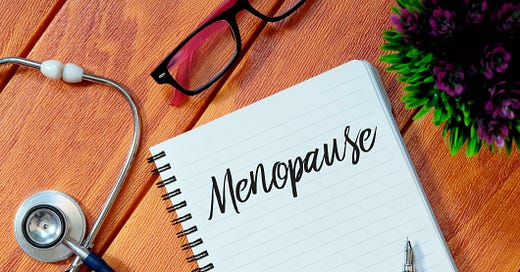Informed Decisions: When Menopause Hormone Therapy Isn't Recommended
A practical guide to the hormone menoverse
After addressing the green light (FDA-approved or generally accepted) indications for menopausal hormone therapy (MHT) and the yellow light reasons (situations when the data isn’t good enough for a formal recommendation but may still be worth trying for some people), we come to the red light indication, or reasons when we don’t recommend starting menopausal hormone therapy.
As I’ve written a few times in this series, MHT is being oversold by some as a ticket to perpetual health and youth, and that’s concerning. It’s misogyny, and medically speaking, if you falsely believe that estrogen can do all kinds of things that it can’t, you are making a decision to take it that is not actually based on informed consent.
It’s important to know about these red light indications or reasons that hormones are not recommended so you can steer clear of what I call the meno-charlatans. And that’s not easy because it’s disinformation whack-a-mole out there. Given my Internet search history, which probably looks similar to yours when it comes to menopause, my Facebook and Instagram feeds are filled with hormone scams.
So let’s get to it. We’ve discussed what hormones can do and what they might do; now, let’s talk about what they can’t do and the reasons why we do not recommend prescribing them.
Skin
There is an old and awful saying in medicine that you can tell by looks whether a woman is taking estrogen or not. First of all, it’s gross because it comes from the era when OB/GYNs were essentially all men, so it meant these men who spoke like this were sizing their patients up looks-wise. Ewww.
This supposed estrogen-hotness connection was popularized in the Pharma-funded book from the 1960s, Feminine Forever. The minds at Pharma realized they could more successfully sell their newly available and easy to mass produce oral estrogen by making menopause a disease. And what was the WORST DISEASE EVER? Being unattractive to men. I mean, duh. Once you lose your breeder status, it’s all downhill from there, babe. So it is beyond disappointing to see this old trope repurposed by many female physicians to promote estrogen for the skin.
There is some observational data, meaning groups of people are observed to try to understand differences, that suggested that estrogen might be beneficial for the skin. With observational data, people are not randomized to estrogen or not; they take it or can’t access it or decide against it for a variety of reasons. But let’s pause for a moment and consider who is more likely to get hormone therapy…someone with money. And then let’s take another pause and consider who is more likely to have skin that is considered by our society to be more youthful. People who haven’t had to work outside in the sun, those with access to health care, those with access to sunscreen, and of course, the ability to pay for Botox, peels, lasers, surgeries, etc. Meaning the observational data for skin and hormones is unreliable.
So with that as context, while there is observational data that suggests estrogen can have an effect on wrinkles, and there is some lab data (meaning looking at the effect of estrogen on skin cells), what is really needed are robust clinical trials. And we have that data. The KEEPs trial, a randomized, double-blind, placebo-controlled trial, showed no impact of estrogen on wrinkles over a four-year follow-up interval. There is another shorter randomized placebo-controlled trial study (48 weeks) evaluating ethinyl estradiol (the estrogen that is typically in the birth control pill, a dose of 10 micrograms a day), and there was no statistically significant difference between estrogen and placebo.
It is SO IMPORTANT (I am shouting) because of the misogyny and tropes associated with estrogen and youth that we use the most rigorous evidence here. There are no high-quality clinical trials that tell us we should disbelieve the KEEPS data, so we don’t recommend estrogen for the skin. Yes, I’m aware there is a small chorus of doctors on Instagram promoting estrogen face cream, and I’ll get to the lack of science, the potential risks, and the misogyny in another post.
Brain Fog
Cognitive issues at menopause include difficulties with word recall and troubling disturbances in everyday living, for example, lost keys or forgetting appointments. This constellation of concerns is often referred to as brain fog, and it’s best thought of cognitive symptoms affecting memory and producing attention deficits. While some women do show changes in verbal learning and word recall during the menopause transition, their testing stays within the normal range. Also, women with these symptoms still typically perform the same or better than men on this testing.
(I feel we need a pause here to let that statement hang in the air for a minute).
Estrogen has not been studied specifically for brain fog. There is data looking at estrogen and cognition in the early postmenopause period, and there was no improvement. Whether estrogen can help the brain in the menopause transition is unknown. There is exciting research emerging on treating brain fog with
Keep reading with a 7-day free trial
Subscribe to The Vajenda to keep reading this post and get 7 days of free access to the full post archives.




